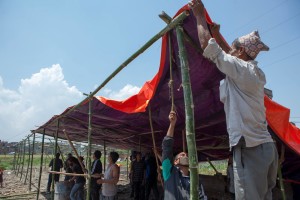Six weeks after the 7.8-magnitude earthquake that affected more than 8 million people hit Nepal, relief efforts are moving forward as fast as possible. The beginning of June marked the beginning of the monsoon season in Nepal, and the people affected by the earthquake who are short on food or without shelter are now more vulnerable to the potential landslides and torrential rains. Immediate needs are shelter, food, blankets, hygiene kits and psychosocial support. We are working with our partners to make sure these most pressing needs are being met.

Locals in Byasi Tole, come togehter to build a temporary shed for the people in Byasi Tole, who have lost their homes following the earthquake.
Temporary shelters are being constructed before the rains begin. Credit: ACT Alliance
Response to Date:
Lutheran World Federation (LWF):
In coordination with The Lutheran World Federation and ACT Alliance, we have distributed ready-to-eat food, hygiene kits, blankets and tarps to 13,718 households in 27 towns and villages.
Lutheran World Relief (LWR):
Working with Lutheran World Relief and ACT Alliance, we have assisted more than 20,000 people affected by the earthquake by distributing food and shelter materials to 4,850 households. Food supplies consist of rice, sugar, lentils, oil and salt, and the packets provide enough food to feed a family of five for 15 days.
Psychosocial support has also been provided to 1,173 people across four districts.
United Mission to Nepal (UMN):
United Mission to Nepal has nearly achieved 100 percent of its targeted distributions in 7 Village Development Committees in Dhading district. Distributions have consisted of emergency food, kitchen utensils, tarps and blankets.
United Mission to Nepal’s Health Team has also completed community-based health trainings on acute malnutrition with health workers in three Village Development Committees in Dhading.
In response to the monsoon season, UMN is exploring possibilities to help plant seeds for rice and vegetables before the rains start.
Nepal’s mountainous terrain remains an obstacle that is slowing down distribution efforts. Helicopters are being used to transport supplies to villages that have been cut-off from road access due to damage or landslides, and even elite climbers are going out to deliver supplies to areas that are only accessible by foot.
Currently, Lutheran Disaster Response is working with our three trusted partners in the area to assist with immediate needs. We know that this response will last much longer than this initial relief process, and we will continue to stay in Nepal to assist with the long-term rebuilding and rehabilitation needs.
Please continue to hold the people who were affected by the earthquake in your prayers, and continue to support Lutheran Disaster Response’s work in Nepal by visiting the Nepal Area Earthquake giving page.
